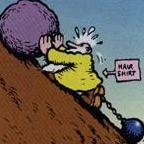Veldor
Posts: 1531
Joined: 12/29/2002
From: King's Landing
Status: offline

|
quote:
ORIGINAL: coregames
Technology is definitely changing games, but computers are only one element of that change. I strongly believe that board gaming with technological support (such as physical pieces on an editable or changable computer board) will revolutionize gaming, and perhaps help bring back wargaming on a board. Complexity such as odds-figuring, supply, etc... can be kept track of through computer, but as long as the pieces are physical, the experience will have tactile diversity rather than the sameness of pointing and clicking with a mouse. Technologically enhanced board games can retain the social interaction over the board that so many enjoy. Computers can help save board games, not just replace them.
ok. But it sounds like your basically agreeing with me. I think its become more a disagreement over what exactly a computer is or will be and what exactly a board game is or will be. But, in a generic sense, what you describe is still Technology replacing what a board game is today.
quote:
quote:
original post from Veldor:
I rarely bring up this point but for every great social experience playing a board wargame there is at least one other disaster that turns into arguments or at the very least, a disagreement, over rules interpretation.
This doesn't happen with a computer game...
Apparently you haven't played games like Heroes of Might and Magic multiplayer... computer gamers get angry when something doesn't go their way too, and if the outlet (even voice, chat, etc...) is there they will express that anger. Only by eliminating any non-game contact can you say this doesn't happen in computer games. If that is really where we are headed, we could eventually all just stay home at our computers, grow pale, maybe evolve larger craniums and smaller weaker legs. Physicality does matter, and I think it's desirable even at the cost of some bickering.
You missed the greater point here. First, while arguments might happen online, they generally aren't going to be over a dis-agreement in rules, if ever. That is an aspect I never enjoyed and encountered even in tournament play. Heck I've even been accussed of not shuffling my UP FRONT card deck sufficiently after I randomly received multiple wire cards and then won another round (as if that was the only reason any way). I've spent 30 minutes digging through the ASL rulebook over an insignificant dispute in what some modifier should have been.
And, more importantly, if I don't like the bickering of someone I am playing against online.. Then, if all else fails, there is a tiny little button I press and only a few minutes later I have a NEW opponent. How I wish I could do that in some of the boardgames I've played.
Now, in both cases, nothing is like finding a good group where your play-styles and personalities (and hopefully skills) match, but again for the random opponents far easier and efficient to do so on the computer. Which keeps things challenging and unique in their own right.
It's one hell of a lot of effort to find varying opponents for any board game these days. Those lucky enough to have opponents in the first place end up predominately always having that same opponent.
And then, for most skilled gamers, your strategies develop more around how to be good at beating that player than they do around being good at the game itself and beating any player. Etc.
_____________________________
|
 Printable Version
Printable Version



















 New Messages
New Messages No New Messages
No New Messages Hot Topic w/ New Messages
Hot Topic w/ New Messages Hot Topic w/o New Messages
Hot Topic w/o New Messages Locked w/ New Messages
Locked w/ New Messages Locked w/o New Messages
Locked w/o New Messages Post New Thread
Post New Thread